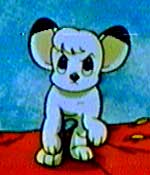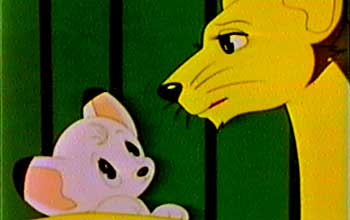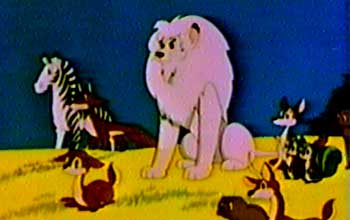 |
|
The Lion's Share |
||
|
Osamu Tezuka, in this early career (and well into his later) greatly admired the work coming out of the Walt Disney
studios. He drew upon the style of, but could never come anywhere near amassing the kind of budget for, Disney films
and animated shorts for inspiration in his own work. It only seems fitting then that Disney would borrow from the
Tezuka style, more specifically "Kimba: The White Lion" to create "The Lion King" - it's all part of that grand,
self-consuming circle of life. But how they really compare is up to this month's KareKano columnists Matt Yamashita
and Shawna James.
|
|
Point - Matt Jim Croce said it best:
"You don't tug on Superman's cape, you don't spit into the wind. You don't pull on the mask of the old Lone Ranger,
and you don't mess around with Michael Eisner, the Disney Company, or any of its global affiliates."
Granted, when they play that song on the radio the last line is " ... you don't mess around with Jim." People who
pick fights with the Mouse don't get a lot of work in this city. And they don't tour Mark Twain's island on board the
good ship Columbia if they value their lives. Think I'm paranoid? So did Jim Croce, and now he's dead.
I've become accustomed to cringing at the sight of prospective column topics (anyone remember the symbolism in
"Samurai X" column? Me neither) but until this month I have never cringed out of pure fear. Why couldn't the column be
about "The Fox and the Hound?" Two childhood friends, driven apart by hate and prejudice, forced to hunt each other to
extinction ... that's what I call family entertainment. But the "Lion King?" Over-produced dribble, with the
billion-dollar world wide gross and the Tony awards to prove it. Journalistic integrity intact, I soldier forth with
this hard-hitting expos�, comforted by the knowledge that only you and five other people ever read this column.
To clarify: there is nothing special about "Kimba the White Lion" - except for his albino coloration, which makes
him rather more suited to sharing a suite with Sigfried than to ruling the jungle. A simple show from a kinder, more
racially insensitive past, Kimba offers plot points as redundant as the title song (everyone now
"... kimba ... kimba ... kimba ... kimba"). Add animation so bad it makes you feel like you just got home from school, and this White
Lion could pass for a white elephant. But Kimba has history on its side - it was one of the first anime series - and
like a pair of old penny loafers, it wears well. I particularly enjoyed the episode in which the forest animals cut
down some trees to start their own farm. Animals deforesting their own habitat. That's so deliciously retro. In the
next episode the animal inhabitants of sub-Saharan Africa are crippled by infectious disease, but the much-needed
medicine is being withheld. Not by greedy American pharmaceutical companies, but by flying lizards. Merck must get a
kick out of that. By the forth episode I was singing the praises of this blast from the past. "Kimba�Kimba�Kimba." It
still beats Elton John.
Who knows what attracted Disney to this forgotten Japanese export? Those big ears do make Kimba resemble a certain
rodent. Perhaps Eisner and company couldn't resist the challenge of making a feature film set in the Serengetti without
showing a single black person. Whatever their reasons, the brain trust in Burbank took Kimba, changed the K to an S,
paid hundreds of people millions of dollars and�presto! A catchy tune about a farting pig. Then it's Julie Taymoor and
sixty-dollar seats for a puppet show and am I the only one starting to miss the little mermaid and her not-so-little
seashells?
Yes, the animation is better. But not sixty million dollars better. Most of that cash had to go to the high priced
voice talent. James Earl Jones, Whoopi Goldberg, and Nathan Lane. Tell the truth, if those three people were having a
conversation in your living room, you'd stay in the kitchen. Can you say grrrating? Jonathan Taylor Thomas can't wait
to be king, and I can't wait either because then he'll be replaced by Ferris Bueller. They've got Cheech. But where's
Chong? How can a movie with that much grass in it not have Tommy Chong. Memo to Mr. Eisner: You paid big money to
Rowan Atkinson to do voice work. Rowan Atkinson is most famous as Mr. Bean - a guy who says absolutely nothing. It's
no wonder the stock is depressed.
Kimba had celebrity voices too. Did anyone notice that Kimba sounded a lot like Rudolph the Red-Nosed Reindeer? I
could almost hear Kimba admonishing Baby New Year, proof positive that more people are in the silly-voice industry today
than in 1962. And the baboon in "The White Lion" sounded like Yosemite Sam and/or every villain from Scooby-Doo. The
baboon from the Lion King sounded like Robert Guillaume, although the voice was actually supplied by Michael Eisner's
black butler, Benson.
(On a completely separate note, both "Kimba" and the "Lion King" featured baboons as sagacious political advisors.
Speaking on behalf of chimps everywhere, this is an outrage. Baboons are to primates as Utah is to the United States.
Namely, the worst we have to offer).
On to an element that should be present in any G-rated animation: Disturbing references to Nazi Germany. What is
up with that hyena-reich musical number? That was the most uncomfortable sequence in a Disney film since the scene in
"The Three Caballeros" in which Donald Duck was held without trial in a South American prison. "Kimba" was not without
its own disturbing allusions to national socialism, as we learn in the opening episode that Adolf Hitler survived the
Allied bombing and escaped to Africa to hunt big game, enlisting as his henchman none other than Popeye's friend Wimpy.
Oh, what mankind will do for a hamburger. And that's what this is really all about. Hamburgers, and happy meals, and
the toys contained therein. Gone are the days of Walt's political fanaticism. Nowadays, if there's a Nazi overtone in a
Disney film, you can bet it was put there after careful market research, the kind designed to put more kids in the seats
and more quarter pounders in the kids. Like I always say, money corrupts even the heart of a lion. Lucky for me I work
for Akadot. (Matt)
|
|||||||
|
Counterpoint - Shawna My friend, Drunken Jippy Pippy, and I were wandering through the Serengetti the other day in search of big game.
DJP was commenting upon the rotten entrails of a mauled zebra (believe me, there's nothing more exciting) when a dusty
colored lion ambled our way, stopped, and then just sat down appearing to go to sleep-lazy sot. The lion's behavior was
pretty typical. All throughout Africa, lions upon lions, white, grey, black or purple, will just spend the day lounging
about. It's really pretty boring. Note: guns help to liven up any situation. Unfortunately Drunken Jippy Pippy and I
had forgotten to bring our guns along on this big game hunt, so we were forced to find our animal entertainment
elsewhere. Just over an arid hill we came upon some major action in the Animal Kingdom. A lioness was kicking some
gazelle's butt. DJP and I remarked to each other how much we enjoyed watching the lioness at work, and then we drove
back to camp and drank soda pop.
When I was given the opportunity to respond to Matt's commentary on such an illustrious topic as Disney's "The Lion
King" and anime original "Kimba: The White Lion," I immediately thought back to my days in the Serengetti. Coming out of
my zen like meditative stance, I realized at once that it really doesn't matter which work is better, or how much Disney
borrowed from "Kimba." I have to agree with DJP, who would often cite, "Bubbles, bubbles, bubbles are fun, but frozen
drinks just split your mind." In other words, both "The Lion King" and "Kimba" fail to represent the true lay of the
land where lioness' kick butt and do all the work for lazy, dead-beat lions. "I just can't wait to be Queen," should
have resounded from Nala's muzzle instead of the usual patriarchal arrogant tripe that Simba harmonizes (and James
Cameron later expands upon). And apparently the creators "Kimba" can't stand the thought of female competition because
they excise lionesses all together, white or otherwise.
But enough of my feminist outburst. If you take "The Lion King" and "Kimba" completely on their own merits, then I
would definitely have to say that I like "The Lion King" better. It moves, it grooves, it stooves.* Let's face it, "The
Lion King" is more fun to watch because the animation and the voice talents are better. That stampede through the valley
is so realistic, I almost had to join a post traumatic stress disorder group because it brought back some pretty tough
memories. Africa's not all fun and games, you know. And Matt is most definitely correct when he says that a dinner
party with James Earl Jones, Whoopie Goldberg and Nathan Lane may grate. Just to spend time with those three treasures
of American theater and cinema would be great!
All in all, "The Lion King" beats out "Kimba" on every level because it's a more recent film. We have better
technology today and better acting techniques. That's why it's so important to remake all the classics. Disney's off
to a good start with "The Lion King," "Tarzan," "The Parent Trap," "Father of the Bride," etc. but the other studios need
to get their acts together. Soon everyone will realize that all classic films really suck the big one-especially those
in black and white. There's no value to so called "classics" unless they are remade today, spruced up with lots of gloss
and product placement, and remarketed with a corporate crossover campaign with a major fast food chain. It is known. It
is true. It is ... the circle of life.
Kimba The White Lion © Tezuka Production / Mushi Production / Right Stuf International.
The views and opinions expressed in The KareKano column are solely those of Matt Yamashita and Shawna James and do not necessarily represent the views of Digital Manga, AKADOT or its sponsors.
|
||||


